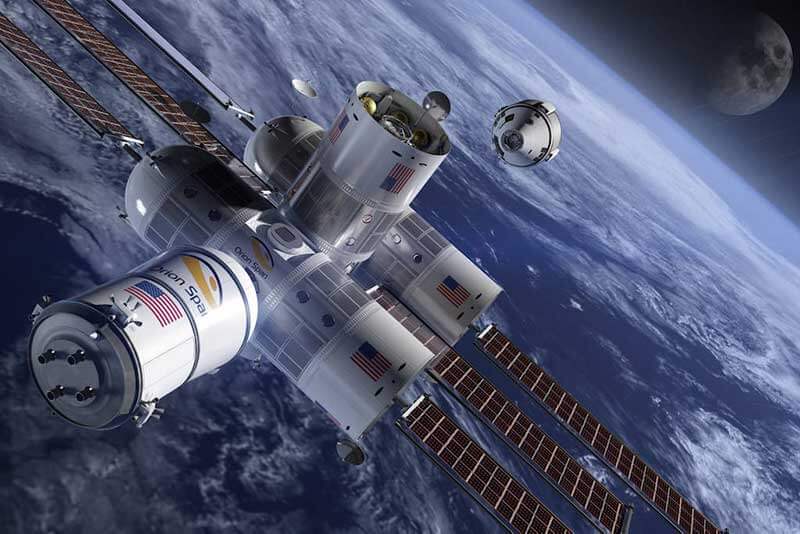- Het eerste luxe ruimtehotel zou al in 2021 operationeel kunnen zijn
- Hoeveel animo kun je verwachten voor $800.000 per nacht?
- Ervaren hoe het voelt om astronaut te zijn
- Niet iedereen is overtuigd
Tot voor kort was het idee van ruimtetoerisme nog vooral sciencefiction. Maar zoals bedrijven als SpaceX laten zien is een ruimte-ervaring straks niet alleen meer voorbehouden aan een handvol hoogopgeleide professionals – binnenkort kan ook de gewone sterveling een paar nachtjes in de ruimte doorbrengen en ervaren hoe het voelt om astronaut te zijn.
Het eerste luxe ruimtehotel zou al in 2021 operationeel kunnen zijn
De in Houston gevestigde startup voor ruimtevaarttechnologie Orion Span Inc. heeft onlangs plannen aangekondigd om tegen 2021 een luxueus ruimtehotel in een baan om de aarde te brengen. Aurora Station wordt 10 meter lang en 4 meter breed, met een drukvolume van 160 kubieke meter, bijna zes keer kleiner dan het Internationale Ruimtestation (ISS). Deze krappe ruimtes bieden plaats aan maximaal zes personen in privésuites – vier toeristen en twee bemanningsleden. En als alles volgens plan verloopt, is het ruimtehotel in 2022 klaar om zijn eerste gasten te verwelkomen. “Wij willen mensen naar de ruimte brengen omdat het de laatste grens is voor onze beschaving”, zegt Frank Bunger, oprichter en CEO van Orion Span.

Aurora Station is modulair opgebouwd en kan indien nodig verder worden uitgebreid. Het was echter ontworpen om operationeel te zijn zodra de eerste module een baan om de aarde heeft bereikt. “Het is een ruimtestation met één module,” legt Bunger uit. “Na lancering kan het onmiddellijk in gebruik genomen worden. Het is niet iets dat je stukje bij beetje lanceert en dan nog in elkaar moet zetten”. Naast ruimtetoerisme is het bedrijf ook van plan om capaciteit op het station te verhuren voor een breed scala aan ruimtemissies, waaronder onderzoek naar microzwaartekracht, productie in de ruimte en validering van ruimtehardware. “Ons doel is om ruimte toegankelijk te maken voor iedereen, door tegen lagere kosten meer waarde te blijven genereren”, voegt Bunger toe.
Hoeveel animo kun je verwachten voor $800.000 per nacht?
Volgens Bunger ontvangt NASA jaarlijks meer dan 18.000 aanvragen, dus er is duidelijk veel belangstelling voor ruimtetoerisme. “We verkopen zeker geen we-gaan-lekker-naar-het-strand equivalent in de ruimte,” zegt Bunger. “We verkopen een astronaut-ervaring. En we denken zeker dat er mensen bereid zijn om voor zo’n ervaring te betalen”.
Het bedrijf kondigde aan dat je voor $9.5 miljoen een 12-daags verblijf kunt boeken – dat is bijna $800.000 per nacht. Geïnteresseerden kunnen met een aanbetaling van $80.000 alvast boeken. Dat geld wordt in escrow geplaatst (een neutrale en financieel betrouwbare derdenrekening) zodat het volledig restitueerbaar is. En hoewel dat in geen enkel opzicht goedkoop genoemd kan worden, is het aanzienlijk voordeliger dan wat concurrenten rekenen. Voor Rusland’s luxe hotelmodule zou je als ISS-gast voor twee weken namelijk rond $40 miljoen moeten neertellen. Bigelow Aerospace heeft hun prijzen nog niet bekendgemaakt maar wel aangegeven dat het waarschijnlijk in de lage acht cijfers zou zijn.
Met Orion Span ervaar je hoe het voelt om astronaut te zijn
Voordat je vol enthousiasme zo’n tripje boekt, moet je er wel rekening mee houden dat ruimtevaarttoeristen van Orion Span drie maanden training moeten volgen voordat ze op reis mogen – wel een stuk korter dan de twee jaar training die astronauten moeten ondergaan. De opleiding bestaat onder andere uit online cursussen over drukcabines, de basics van ruimtevluchten en wat zo’n baan om de aarde eigenlijk inhoudt.
Als de ruimtereizigers eenmaal op het ruimtestation zijn kunnen ze gewichtloosheid ervaren, bekijken hoe de aarde eruit ziet op 320 kilometer afstand, de aurora borealis observeren, 16 zonsopgangen en zonsondergangen per dag meemaken, voedsel in de ruimte kweken en het mee naar huis nemen, op het holodeck spelen en zelfs met hun familie en vrienden live streamen. Wanneer het tijd is om terug te keren naar huis, zullen ze als helden verwelkomd worden.
Niet iedereen is overtuigd
Ook is er veel scepsis rond het project. “De commercialisering van LEO (low Earth orbit of lage baan om de Aarde) is een opwindend vooruitzicht, maar we zullen moeten zien welke ideeën het meest realistisch zijn”, zegt Phil Larson, voormalig SpaceX-werknemer en assistent decaan van de Universiteit van Colorado aan Boulder’s College of Engineering and Applied Science. Als het om de ruimte gaat is het vaak lastig om onderscheid te maken tussen feit en fictie.
Orion Span is bijvoorbeeld nog steeds op zoek naar financiering, ook al hebben ze nog niet onthuld wat ze nodig hebben of hoeveel ze tot nu toe hebben kunnen inzamelen. “Er is zeker wel interesse en we zoeken nu de juiste financiële partner om mee in zee te gaan”, zegt Burger. “We zoeken iemand die niet gefocust is op een snelle deal. Het moet een langetermijn-samenwerking zijn”.
Ook hebben ze nog geen lanceerleverancier gevonden, maar ze hopen dat ze iemand enthousiast kunnen maken om hen de reizen gratis of tegen een aantrekkelijke prijs aan te bieden – in ruil voor capaciteit op het ruimtestation. Er is ook niet veel bekend over hun technologie, maar Bunger beweert dat ze propriëtaire systemen hebben ontwikkeld waarmee ze de kosten voor ruimtereizen aanzienlijk kunnen terugdringen. Hij heeft er ook voor gezorgd dat het station compatibel is met verschillende lanceerplatforms, waaronder SpaceX, United Launch Alliance en Arianespace. De recente opkomst van raketlanceringsbedrijven als SpaceX heeft de kosten om materiaal in een baan om de aarde te brengen aanzienlijk verlaagd. Het zijn ook precies de dalende lanceerprijzen die Orion Span in staat stellen om de prijs voor een reisje naar de ruimte te verlagen tot minder dan $10 miljoen per persoon, aldus Bunger.
Een ander punt is dat de fabriek in Houston – waar het station gebouwd moet worden – zelf nog niet is gebouwd. Burger beweert echter dat die kwestie de komende negen maanden wordt opgelost. Ook een dingetje is dat hij geen enkele ervaring heeft met ruimtevluchten. Hij heeft altijd management- en engineeringfuncties bekleed bij verschillende techbedrijven. Gelukkig hebben een aantal werknemers in zijn bedrijf – zoals de belangrijkste architect en een paar waardevolle technische medewerkers – wel ervaring; zij hebben bij NASA gewerkt.
In de afgelopen jaren hebben we een groeiend aantal bedrijven zien toetreden tot de commerciële ruimtetoerisme-arena, ook al is geen van de ruimteprojecten nog volledig verwezenlijkt. Toch lijkt het er wel steeds meer op dat het een kwestie is van tijd voordat ruimtetoerisme werkelijkheid wordt. Het is dus heel goed mogelijk dat je volgende reis naar de ruimte gaat. Tenminste… als je een dikke spaarpot hebt.
Share via:


